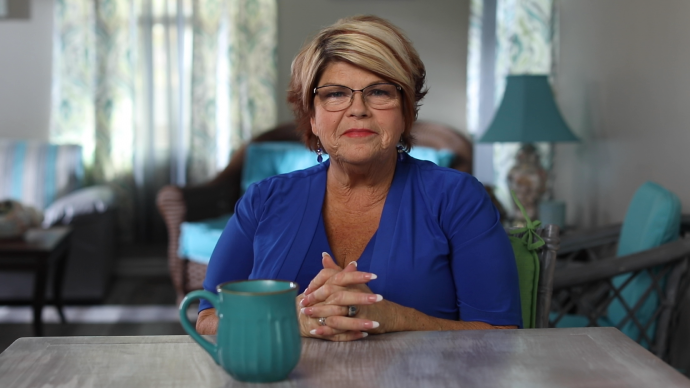Bobbi Jo Reed remembers a that day she walked out of a Kansas City, Missouri, hotel shaking in need of alcohol. In her twenties at the time, she had been an addict since the age of twelve.
On that particular day, she made her way down to a nearby liquor store, where she agreed to go with four men sitting outside to a barbeque with the sole objective of getting a drink. The men instead led her to railroad tracks and raped her.
“They rip my clothes off, they’re beating my head into the rocks by the railroad track. One guy takes off. They cut the bottom of my feet open so I couldn’t run, and three of them brutally raped me there,” Reed remembers.
They then brought her back to a house where they locked her in a room and plotted to kill her before she escaped through a second story window two days later. It wasn’t until years later Reed found herself in a stable environment and free of her addiction.
Reed tells the story part of a new documentary, Bobbi Jo: Under the Influence, that details her journey from a drug and alcohol addict on the streets of Kansas City to someone who, through what she describes as a call from God, now provides stable environments for addicts on the path to a fresh start at life.
The documentary is available on streaming platforms that include Google Play, Amazon Prime Video, YouTube, Vimeo and Microsoft.
In 2003 – eight years after her sobriety in 1995 at the age of 34 – Reed founded Healing House Inc. and opened the first Healing House women’s shelter in Kansas City. It provided 17 beds for recovering women. At the time, there were approximately 900 women in Kansas City undergoing inpatient treatment, but only 24 safe residential beds available once they finished.
The company has since blossomed into a full-fledged community in what was once a section of northeast Kansas City riddled with drugs, gang violence and prostitution. Today there are five Healing Houses for women, five for men, two apartment buildings for families, a house for mothers and newborns, a day care, meeting hall, company headquarters, a Recovery Community Center and a community gym.
“God has never told me, ‘Bobbi Jo you’re done have a seat.’ God motivates my heart to see where the need is,” Reed told Crux. “At first the need was for single women, then the need became women with babies and children, then men came into the picture, then it’s like what else do these folks need?”
Brent Jones, the film’s director, spent a year interviewing staff members, former and current residents of Healing Houses and gathering footage. Throughout the film they offer testimonials about where they came from, and where they’re headed thanks to Healing House.
Jones told Crux you can feel “that (Holy) Spirit in you” at the houses.
“You watch people get their lives back. You watch them go from a chaotic, dark place. You watch that transition happening and there’s nothing like watching that happen,” Jones said.
Donna Jones, Brent’s wife and producer of the film, likens the environment to a Church.
“The presence of (God) is in every one of Bobbi Jo’s homes. In those apartments. In her community center. In her headquarters. It’s like walking into the doors of a church,” Donna told Crux, starting to tear up. “You just want to go back and even just sitting on Bobbi Jo’s porch this calm comes over you because you know that you’re there and you’re in a safe place.”
Healing Houses serve nearly 300 men and women a year. And have served a total of over 8,000 people in recovery. Of 41 employees, all but two are from within, which Reed says gives residents hope they can make it through.
“When they hear somebody else speak their truth and come out on the other side it is so encouraging to the person that’s sitting there that well, if she can do it I can do it.”
Reed said people are even apprehensive sometimes when they arrive because they’re thrown “this big bucket of love” that they’re not used to.
“In the world of addiction, your heart gets hard. So, when they get here people are saying they love them, they’re hugging them, they’re saying this is your bedroom and they think, ‘wow, is this real?’” Reed said. “Within a week to two weeks they’re like, ‘man, I’m home,’ and that’s what Healing House is all about.”
She also expects to grow the community well into the future. In the film, she says she won’t stop working until they dig the hole in the ground. Already, they’re getting ready to renovate existing buildings with four three-bedroom apartments for families. Another recent purchase was a strip mall across from the community center that some workers refused to stop using drugs in back of.
“The opportunity presented itself for us to get that building and that changed their lease a little because there’s no illegal drug use allowed on the property. God is so good it’s amazing,” Reed said, with a chuckle.
When Brent heard about the strip mall and future plans, he made the point that if “we all did 1/10 of what Bobbi Jo did, the problems would be solved.”

